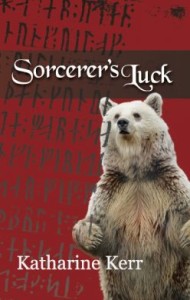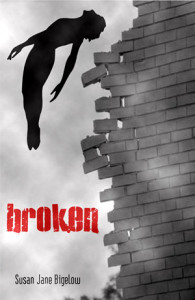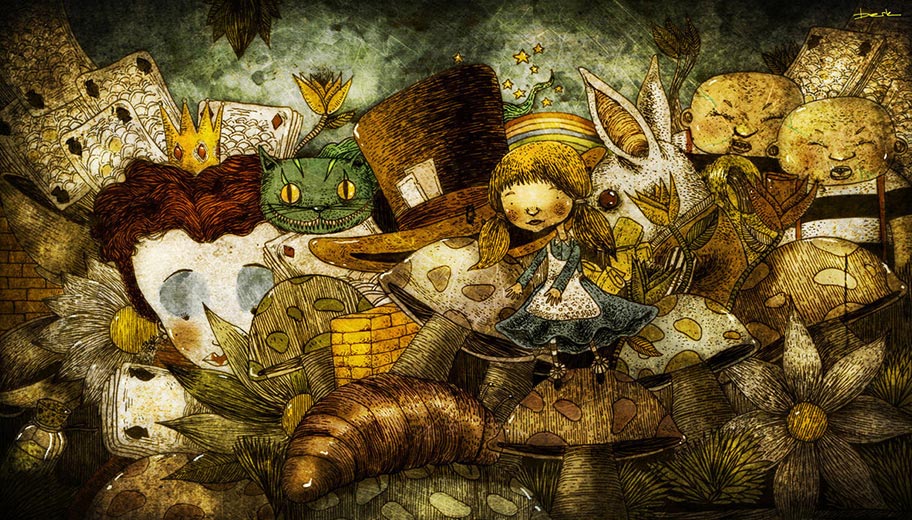Publisher: Osel Books -
Pages: 278 -
Buy: Book/eBook

Here at A Dribble of Ink, given that Aidan Moher and Kate Elliott are currently two posts in to their joint reading and analysis of Daggerspell, book one in Katharine Kerr’s fifteen-volume Deverry saga, it seems like a pertinent time to review Kerr’s latest novel, Sorcerer’s Luck – not only because it’s a refreshing, enjoyable read in its own right, but because it serves as a solid introduction to Kerr’s thematic style. Which is a useful thing to have to hand: as much as Deverry constitutes one of my absolute favourite series of all time (and for anyone interested in some of my slightly spoilerish thoughts on same, they can be found here), even though the series is finished, fifteen books is a lot to ask anyone to invest in without some proof that they’ll enjoy the author’s writing. This is, for instance, the big problem with recommending Terry Pratchett’s Discworld to first-time readers: whichever book we might personally view as the apex of the series (mine is Night Watch), a big part of our love for it invariably comes from the fact that we already know the characters from earlier stories. I was, therefore, immensely pleased when Pratchett went and wrote Nation, an incredibly powerful book that not only exemplifies the best of his style, but which neatly cuts through the issue of recommending any one Discworld novel as a starting point.
Which brings me back to Sorcerer’s Luck: a story about the relationship between Maya Cantescu, a struggling art student and vampire-but-not-really based in San Francisco, and Tor Thorlaksson, a wealthy sorcerer and bjarki – that is, someone who shapeshifts into a bear. Among her other talents, Maya has the ability to see through illusions, and when Tor finds himself being haunted at the dark of the moon by otherworldly manifestations, he hires Maya to see through them. But their professional relationship soon becomes complicated, not only by their mutual attraction to one another, but by the increasingly violent actions of Tor’s sorcerous enemy. What’s the real reason for Maya and Tor’s connection? And what does Tor’s unknown opponent want? Read More »
Even if you put aside problematic assumptions of biological determinism, there’s still one thing I just can’t understand: why on earth would a fantasy world have to conform to the (supposed) rules of this one?
Lately there have been questions as to whether epic fantasy is inherently “conservative.” The term is sometimes specified in terms of political movement or ideological conservatism, but more broadly refers to the production and reproduction of social convention. I have serious doubts about the ideological bit, a point already well articulated by Liz Bourke. Unfortunately, I have little doubt about the rest—particularly in comparison to epic fantasy’s sibling genre, science fiction. But why is that, and does it really have to be that way?
I started thinking about these questions after reading excellent essays by Kameron Hurley and Foz Meadows on the historical precedent for women warriors in epic fantasy (as well as Django Wexler’s epic follow-up piece), and particularly after being drawn into a vigorous online discussion on that topic. The prevalent counter-argument, as I understand it, is this: for biological-evolutionary reasons (lesser upper body strength, necessity for the slow human reproductive process, greater empathy, etc.), women in our world are less likely to be soldiers; therefore, they should be less common as soldiers in fantasy worlds.
Huh? Read More »
Publisher: Candlemark & Gleam -
Pages: 338 -
Buy: Book/eBook

Whenever I encounter the argument that reviewers ought not to speak negatively of any book they didn’t like, but should instead say simply that the story, while not to their taste, might well be to someone else’s, I experience the overwhelming urge to tear out my hair by the roots. If all reviews were necessarily positive, there’d be little point in reading them: the mere fact of their existence would tell us that the reviewer liked the book, and while there might be some residual interest as to why, after a while, I suspect that the lack of contrast would render the whole endeavour redundant. Individual taste is undeniably a subjective thing, but that doesn’t mean we’re wrong to feel strongly about it, and it certainly doesn’t moot the function of criticism – and subjectivity aside, there’s still such a thing as quality. For instance: if a restaurant served me overcooked steak, flavourless gravy and limp vegetables in a filthy environment, then my best and most useful response is not to swallow my objections on the basis that someone, somewhere might’ve enjoyed the meal, such that warning my friends to eat elsewhere would unfairly endanger the chef’s livelihood.
The point being, it’s incredibly disingenuous to pretend that individual taste is only composed of positives, or that what we enjoy matters more than what we don’t. To stick with the food metaphor, if someone wanted to gain a complete understanding of my palette, my strong dislike of bitter flavours, aniseed products and raw vegetables would be equally as important as my love of good cheese, wine and sashimi. It’s contrast that gives the full picture, and when it comes to book reviews – or reviews of any sort, for that matter – it’s the balance between negative and positive opinions that allows the reader to fully compare the critic’s taste with their own. Read More »
 I’m happy to introduce Foz Meadows, the newest contributing reviewer here at A Dribble of Ink. Foz joins Justin Landon as a contributing reviewer and will be publishing monthly reviews covering a wide range of novels. You might recognize Foz’s work from her own blog, Shattersnipe, her contributions to the Huffington Post, and her past writing here at A Dribble of Ink, including yesterday’s essay on escapism and privilege in Fantasy and Science Fiction. The Book Smugglers, in discussing their choices for the 2013 ‘Best Fan Writer’ Hugo award, described Foz as having ‘written some of the BEST blog posts and articles last year addressing sexism, racism, problematic narratives in Fandom and in YA, all in relation to SF,’ and I’m incredibly proud to bring a writer with such pedigree to A Dribble of Ink.
I’m happy to introduce Foz Meadows, the newest contributing reviewer here at A Dribble of Ink. Foz joins Justin Landon as a contributing reviewer and will be publishing monthly reviews covering a wide range of novels. You might recognize Foz’s work from her own blog, Shattersnipe, her contributions to the Huffington Post, and her past writing here at A Dribble of Ink, including yesterday’s essay on escapism and privilege in Fantasy and Science Fiction. The Book Smugglers, in discussing their choices for the 2013 ‘Best Fan Writer’ Hugo award, described Foz as having ‘written some of the BEST blog posts and articles last year addressing sexism, racism, problematic narratives in Fandom and in YA, all in relation to SF,’ and I’m incredibly proud to bring a writer with such pedigree to A Dribble of Ink.
I was first introduced to Foz’s writing last year after recommendations from several other critics and blogging friends. Her reviews and commentary are sharp, insightful and intelligently engage with many of the important issues being discussed in the overall SFF discussion. For a proper introduction to Foz’s writing, I encourage you to check out her 2012 Year in Review. I feel that adding Foz to the team at A Dribble of Ink will continue to expand and add variety to the areas of coverage and topics of conversation covered, which, in this editor’s opinion, is a very good thing.
So, then, here’s to Foz.
When it comes to discussing the appeal of SFF and its various affiliated subgenres, escapism is an extremely relevant consideration. Given how strongly a pro-escapist perspective correlates with a pro-SFF perspective, and vice versa, the term has become a loaded one, such that a species of argumentative shorthand has developed around its usage. Thus: if escapism is a negative, then so too is the desire for escape, casting those who seek or enable it as naïve, childish daydreamers disconnected from reality. If escapism is a positive, then the pursuit of escape is a noble one, allowing us to transcend the limitations of what is in favour of embracing what could be. Though ostensibly a tried and true dichotomy, the term is ultimately inaccurate in this context: the escapist/realist schism is a false binary, not only because the presence of one element doesn’t preclude the presence of the other, but because both escapism and realism are subjectively realised states, not objective truths.
If escapism is a negative, then so too is the desire for escape, casting those who seek or enable it as naïve, childish daydreamers disconnected from reality.
Despite this fact, the fallacy remains a popular one, both at the external level (SFF is less realistic than straight fiction, and therefore less worthy) and the internal level (aspirational fantasy is less realistic than gritty fantasy, and therefore less worthy). Which isn’t to say such conversations are wholly without merit; indeed, a great deal of useful dialogue is spawned by them. It’s just that, at a fundamental level, there’s a tendency to hark back to an either/or that doesn’t exist, but to which we’ve historically ascribed inordinate importance. By definition, all fiction contains elements of escapism and realism, in that it both includes untruths and, being born of reality, is necessarily tethered to it – the only mitigating factor here is the ratio of truth to lies, and given the wildly divergent ends to which fiction can be turned, to say nothing of the myriad possible interpretations of truth, there’s hardly a rule of thumb for determining even that much with any degree of accuracy. The question of whether escapism constitutes a positive or negative force in SFF has nothing to do with its presence, therefore, but rather with the twofold matter what it is we’re escaping from and into. Read More »



 I’m happy to introduce Foz Meadows, the newest contributing reviewer here at A Dribble of Ink. Foz joins
I’m happy to introduce Foz Meadows, the newest contributing reviewer here at A Dribble of Ink. Foz joins 
